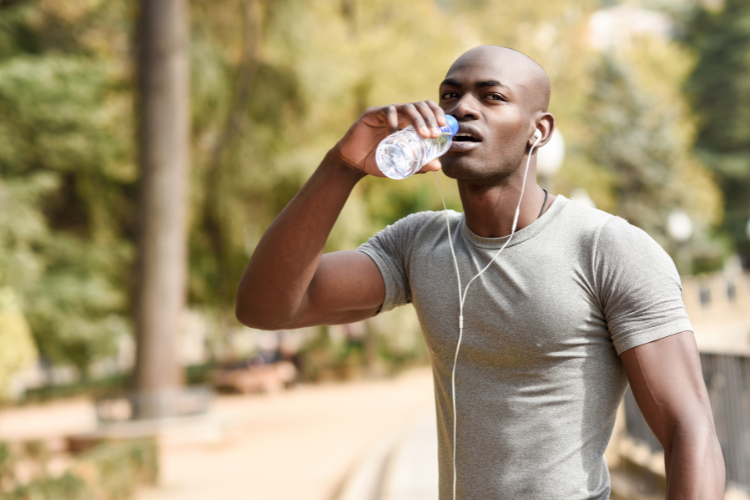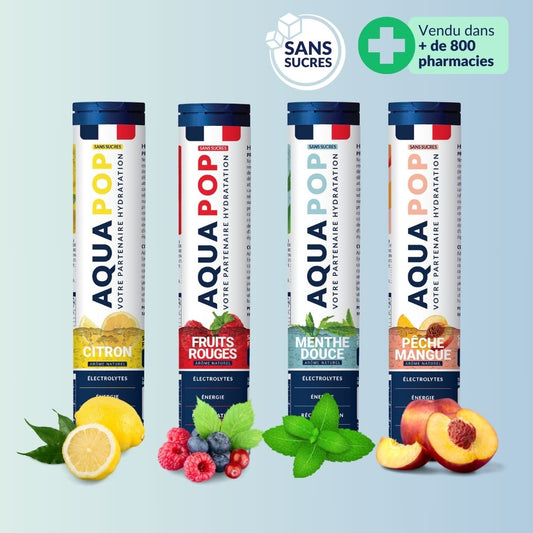The Hédonist Labs team
For sportsmen and women, managing electrolyte requirements properly is essential. Why... and how?
When electrolyte balance rhymes with quality sports performance. Electrolytes are electrically-charged minerals present in the human body, playing a crucial role in maintaining homeostasis and the proper functioning of cells, tissues and organs.
Among the main electrolytes are sodium, potassium, calcium, magnesium and chloride. Their balanced presence is essential for regulating hydration, nerve transmission, muscle contraction and other vital processes.
For athletes, proper electrolyte management is of particular importance. During exercise, the body loses these minerals through perspiration, and an electrolyte imbalance can lead to reduced performance, muscle cramps, increased fatigue and even serious complications such as dehydration or hyponatremia.
Essential electrolytes for sportsmen and women consist mainly of sodium, potassium, calcium, magnesium, and other elements in smaller quantities such as chloride or phosphate. Each of these electrolytes plays specific roles crucial to the optimal functioning of the human body, particularly during intense physical activity.
- Sodium :
- Function: Helps maintain water balance, regulates blood pressure, and promotes nerve transmission and muscle contraction.
- Examples of sodium-rich foods: table salt, soups, pickled foods, cheese, bread.
- Potassium :
- Function: Plays a key role in regulating heartbeat, muscle contraction (especially cardiac and skeletal), and maintaining water balance.
- Examples of foods rich in potassium: bananas, potatoes, spinach, avocados, tomatoes.
- Calcium :
- Function: Essential for bone health, muscle contraction, nerve transmission and blood clotting.
- Examples of calcium-rich foods: dairy products (milk, cheese, yoghurt), tofu, almonds, sardines.
- Magnesium :
- Function: Contributes to energy production, protein synthesis, muscle relaxation and bone health.
- Examples of magnesium-rich foods: pumpkin seeds, walnuts, spinach, cocoa, whole grains.
It is important for athletes to ensure a balanced diet providing adequate quantities of these electrolytes, either through the diet or possibly through supplements, depending on their individual needs and the demands of their physical activity.
ELECTROLYTE LOSSES
During physical activity, the body loses electrolytes mainly through perspiration, respiration and, to a lesser extent, urine. This loss is influenced by a number of factors, including exercise intensity, temperature, humidity, duration of exertion and individual physical condition.
Excessive electrolyte loss can lead to health and performance risks for athletes, including dehydration, muscle cramps and increased fatigue. It is therefore crucial for athletes to monitor their electrolyte losses, maintain adequate hydration and replenish these essential minerals according to their individual needs and the specific conditions of their sporting practice.
ASSESSING ELECTROLYTE REQUIREMENTS IN ATHLETES
The assessment of electrolyte requirements in athletes generally involves several methods:
- Blood analysis Measurement of electrolyte concentrations in the blood to assess imbalances or deficiencies.
- Body fluid assessment Measure body weight loss before and after exercise to estimate water and electrolyte losses.
- Urine analysis Evaluation of electrolyte concentration in urine to estimate losses.
Individual factors such as body weight, type of activity, duration and intensity of exercise influence electrolyte requirements. General recommendations include adequate hydration before, during and after exercise, using electrolyte drinks where necessary, and adjusting intakes according to estimated losses and environmental conditions.
Post-exercise rehydration is essential to restore the body's fluid and electrolyte balance, optimize recovery and prevent complications associated with dehydration. Isotonic beverages, containing electrolytes such as sodium and potassium, are recommended to replenish fluid and mineral losses.
Electrolyte supplements can be useful in certain situations, but it's important to use them with caution, respecting recommended doses, to avoid electrolyte imbalance.
IMPACTS OF ELECTROLYTE IMBALANCES
Electrolyte imbalances can lead to reduced physical performance, muscle cramps, increased fatigue and even serious complications such as dehydration or hyponatremia.
Maintaining an optimal electrolyte balance is crucial to health and sports performance. Case studies show that imbalances can adversely affect the performance and health of athletes, underlining the importance of proper electrolyte management.
For future research in this area, it would be beneficial to better understand individual electrolyte requirements in relation to different types of physical activity, fitness levels and environmental conditions.
In-depth studies on rehydration and electrolyte rebalancing strategies specific to different sports and different athlete profiles could also help optimize performance and reduce the risk of complications linked to electrolyte loss. By investing in such research, we can better support athletes in their quest for success and health.




